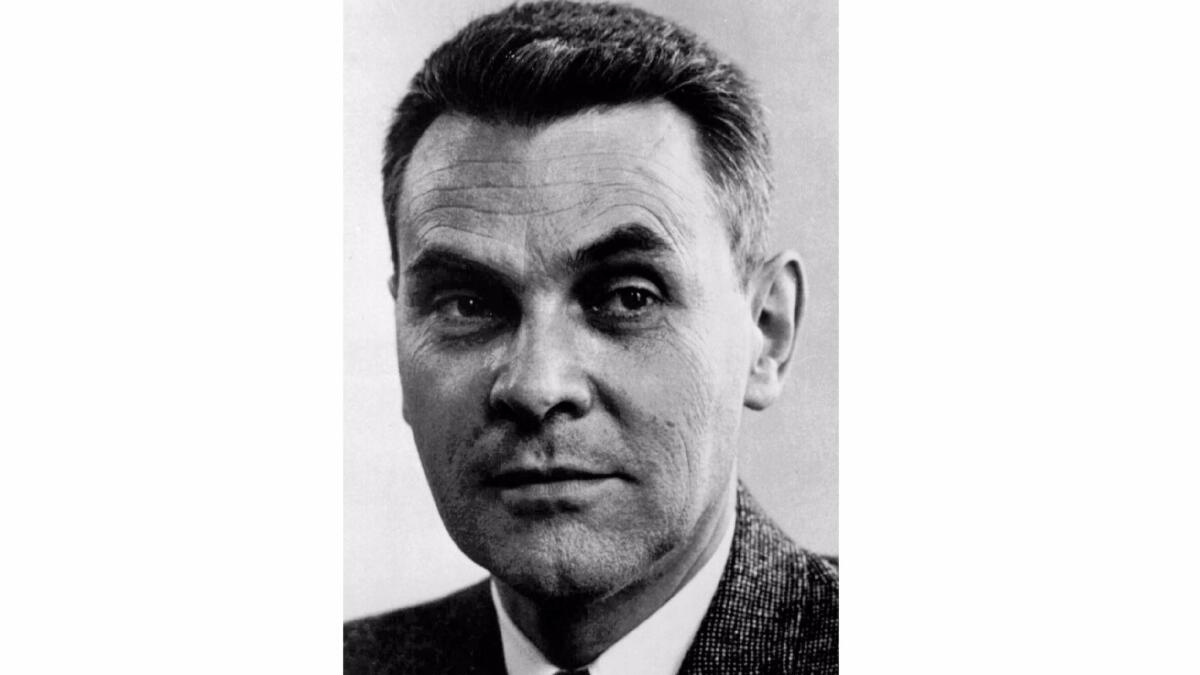William H McNeill, prize-winning world historian, dead at 98

- Share via
William H. McNeill, the groundbreaking scholar who wove the stories of civilizations worldwide into the landmark “The Rise of the West” and described the power of disease to forge history in “Plagues and People,” died Friday. He was 98.
McNeill, who died in Torrington, Conn., wrote more than 20 books, notably “The Rise of the West: A History of the Human Community,” published in 1963. The New York Times called it “the most stimulating and fascinating” work of world history ever released. It won the National Book Award, sold well despite exceeding 800 pages and later was ranked No. 71 by the Modern Library among the 20th century’s best English-language nonfiction books.
McNeill sought new ways to explain the world. He didn’t explore history through the feats of great men but through everyday innovations, contacts between civilizations, and disease. He investigated how such changes as better-designed plows or potato cultivation propelled human societies — and how pathogens defeated them. His books had sweep and brimmed with daring, provocative ideas.
He wrote “about big topics, trying to speak to a bigger audience,” said Ian Morris, a Stanford University history professor.
Morris said McNeill’s writing was especially influential in places such as California, where few students identified with the traditional way of teaching history via “straight-down-the-middle Western Civ” courses focused Great Britain and Europe.
McNeill painted history against a sprawling new canvas, demonstrating “that there is this whole world out there — that you have to look at the world on a global scale and look at the different strands of history,” Morris said.
“And he was such an unusual guy, that was just the beginning for him,” Morris added.
McNeill had a knack for flipping conventional wisdom on its head and upending long established paradigms, as he did in his 1983 work “The Great Frontier: Freedom and Hierarchy in Modern Times.”
It was published at a time when historians of the American West were just beginning to break free of the influence of Frederick Jackson Turner, who associated frontiers with freedom and opportunity, said Stephen Aron, UCLA history professor. “That is the way the myth of the West has been told — ‘go west for freedom,’ ” he said.
McNeill inverted this by suggesting that labor scarcity meant labor often had to be compelled in frontier regions, Aron said. Thus, frontiers tended to be areas of forced labor, McNeill argued — just the opposite of the mythology. His insights influenced a subsequent generation of scholars of the West, making them more attuned to “the spectrum of unfree labor” and the conditions under which it occurs, Aron said.
“The Rise of the West,” even in its title, was a direct challenge to Oswald Spengler’s “The Decline of the West.” It also served as counterpoint to Arnold Toynbee, then the reigning scholar of world history. Toynbee believed that civilizations had essentially developed independently and their stories were separate. McNeill countered that they were very much part of one story.
“Indeed, world history since 1500 may be thought of as a race between the West’s growing power to molest the rest of the world and the increasingly desperate efforts of other peoples to stave Westerners off,” wrote McNeill, who also cautioned that another civilization could yet overtake the West.
McNeill welcomed disagreement, and in a “retrospective essay,” he noted that “The Rise of the West” was in part influenced by the Cold War and the United States’ post-World War II ascendance. He underestimated the Chinese, “gave undue attention to Latin Christendom” and showed “scant concern for the sufferings of the victims of historical change.”
His subsequent books included the 1976 release “Plagues and People,” in which he was among the first to examine the impact of infectious disease in history, from ancient Eurasia to the 20th century. It helped launch a field of scholarship that includes Jared Diamond, Laurie Garrett and Richard Preston.
Other works included “The Pursuit of Power” and a biography of Toynbee. In 2003, he collaborated with his son, J.R. McNeill, on “The Human Web: A Bird’s Eye View of History.” His memoir, “The Pursuit of Truth,” came out two years later.
He was born in Vancouver, Canada, in 1917. His father, John T. McNeill, was a theologian and historian; the younger McNeill would see his own scholarship as a secular version of his father’s calling. He studied at the University of Chicago, then got his PhD at Cornell University. His formal education was suspended during World War II when he served in the Army five years. But he continued to observe and absorb. He shared quarters with men of widely differing backgrounds.
“What better experience could a historian have than to find himself observing revolution and counterrevolution close-up?” he wrote in his memoir.
He married Elizabeth Darbishire. He joined the faculty of the University of Chicago and remained for 40 years.
He worked for years on what he knew would be his “big book.”
“I typed the manuscript of ‘The Rise of the West’ on a portable Underwood noiseless typewriter that my parents had given me as a 21st birthday present,” he wrote in his memoir. “It was accompanied by a verse my father composed inviting me to ‘write a book of lasting worth.’ ”
Leovy is a Times staff writer; Italie writes for the Associated Press.
UPDATES:
3:21 p.m.: This article was updated with additional quotes and details.
This article was originally published at 10:20 a.m.
Start your day right
Sign up for Essential California for the L.A. Times biggest news, features and recommendations in your inbox six days a week.
You may occasionally receive promotional content from the Los Angeles Times.



